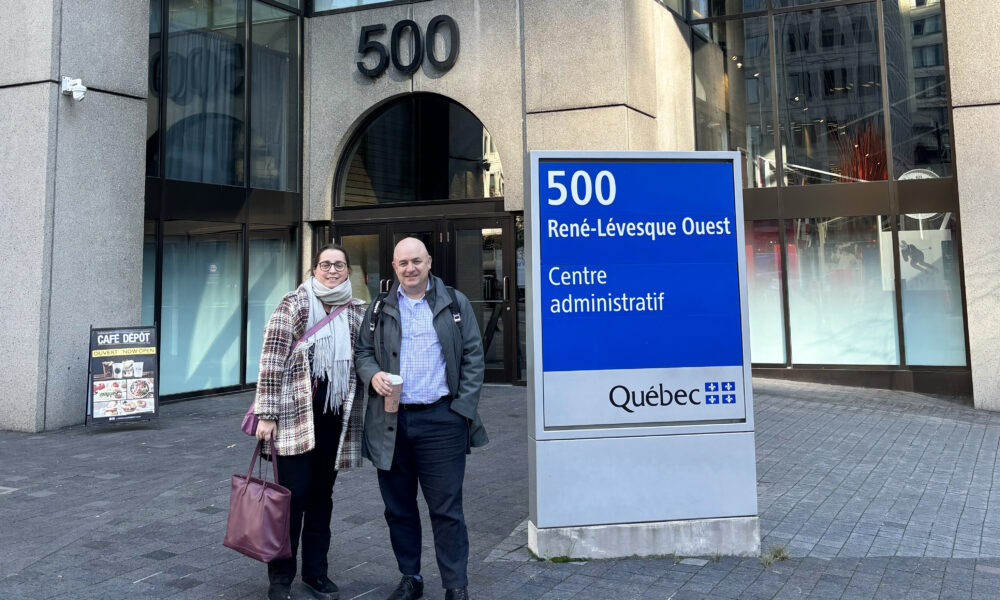On Nov. 3, McGill and the Association of McGill Professors of Law (AMPL) gathered once again at Quebec’s labour tribunal office for a hearing to discuss whether the faculty’s Associate Deans belong in the union. Since November 2022, AMPL has been the certified bargaining unit for the Faculty of Law’s tenured and tenure-track professors, but shortly after its accreditation, the McGill administration filed for appeal against the Tribunal administratif du travail (TAT) decision.
At the hearing, held before Judge Stéphanie D’Alessandro, Faculty of Law Dean Robert Leckey and McGill Director of Labour Relations Francis Desjardins appeared on behalf of the university with a legal team including Corrado De Stefano and an associate, while AMPL President Evan Fox-Decent and the union’s lawyer Sibel Ataogul sat across from them.
Leckey, who has served as the faculty’s Dean since 2016, testified first as Ataogul questioned him on the differences between Deanship and Associate Deanship. Leckey revealed that he receives a stipend for his role as Dean, in addition to his base salary subject to the university’s Academic Salary Policy. McGill increased the Dean stipend, which was approximately $30,000 at the beginning of his term, annually to eventually reach around $100,000 in 2022, according to Leckey’s testimony. The stipend for Associate Deans at the Faculty of Law was raised once in 2018 from $5,000 to the current amount of $7,500.
Ataogul then called former Associate Dean (Graduate Studies), Professor Richard Gold, to the stand to explain the Associate Deans’ responsibilities and powers in the faculty. In a post-hearing interview with The Tribune, Gold emphasized that tenured law professors take turns serving as Associate Deans every three years to allow their pre-tenure colleagues to advance their careers and research portfolios.
“Taking your turn doesn’t mean turning into management, it just means you’re doing your best to contribute to the good of the faculty, governed by the faculty,” Gold said. “Our Dean might get something like a $100,000 stipend for being Dean, but […] a few thousand dollars is a token of appreciation. If this were a serious management position, we’d be getting paid $50,000 or 60,000 more.”
Fox-Decent, who also took the stand to affirm Gold’s description of the faculty’s Associate Dean roles, believes that the Nov. 3 testimonies provide compelling evidence for including the positions in the bargaining unit. He criticized the university’s costly and litigious attitude toward unionization.
“At a time when the Principal is sending messages that we may be facing shortfalls in the tens of millions of dollars, I’m not sure that their funds are best spent paying an employer-side lawyer $900 an hour to fight cases against us that have very little merit,” Fox-Decent told The Tribune post-hearing.
Associate Deans are not the only position the university has tried to exclude from the bargaining unit. Recently, AMPL won a settlement against McGill that allowed them to represent jointly-appointed faculty members. Law and political science professor Víctor Muñiz-Fraticelli is one of the two jointly appointed professors whose membership was recently formalized.
“If you had asked me five years ago [about unionizing] I would have said, ‘No, […] we ought to be participating in the governance of this institution in a collegial way, which means not thinking of ourselves as employees,’” Muñiz-Fraticelli said. “During the pandemic, I was brutally awoken to the fact that I was […] an employee, and if the university treated me as an employee, I ought to react with the instruments that the law gives me [….] [The union] is something that makes me feel much closer to my colleagues and allows me to participate in that shared governance in a much better way.”
Dean Leckey and the university’s media relations office declined The Tribune’s request to comment.
The case’s next hearings are scheduled for Dec. 4 and Dec. 6.










